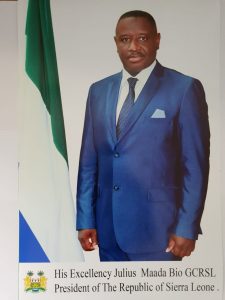 Fellow citizens, welcome to a new year – a time to bid farewell to 2019 and a time to look forward to 2020.
Fellow citizens, welcome to a new year – a time to bid farewell to 2019 and a time to look forward to 2020.
As we look back into 2019, we were shackled with high domestic and foreign debt repayments, unfavourable mining lease agreements, low domestic productivity, high youth unemployment, high inflation and currency depreciation. Throughout the year, our confidence and optimism as a nation were shaken by mild economic turbulence and unavoidable shocks we inherited.
Typically, Sierra Leoneans have made light of the situation with the usual humorous jibe, “the grown dry”. But in 2019, we also made huge progress. We launched the medium-term national development plan; increased domestic revenue mobilisation by streamlining and automating revenue collection and deposit processes; clarified and reduced the tax and duty burden on businesses; made it easier to establish and run a business including providing aftercare at the highest levels and provided more support for small to medium enterprises. We do this with the firm belief that private enterprise is the engine for economic expansion.
As we look forward into 2020, our Country is at peace with falling crime rates, lower prison populations and no security threat. At Bintumani 3, Sierra Leoneans suggested ways to further lower tensions and establish a permanent infrastructure for peace. We have moved to repeal criminal libel laws that successive governments had used to suppress free speech. We continue to open up civic spaces and we encourage our citizens to speak up and make our democracy stronger and better.
In spite of the cynicism about foreign travel, we have, through those travels transformed the reputation and image of Sierra Leone abroad by comprehensively telling our friends and partners who we really are and where we are taking our nation. And they have watched our unrelenting and determined fight against corruption. We passed the MCC’s “Control of Corruption „indicator with very high scores. They have watched us crack down on fraud and waste and reform public institutions and practices. And you know what, the IMF, EU, DFID, World Bank and our international partners have all expressed confidence in what we are doing and they have re-engaged fully. We have actively promoted business in Sierra Leone through various investment conferences and foreign delegations have visited our country to explore investment opportunities.
The fisheries, tourism, and agricultural sectors are set for significant foreign private sector investments in the near future. We are focused on rice-sufficiency, cash crop production and agricultural value-chain addition.
As we go into 2020, more than two million children, especially girls, have access to free quality education, free teaching and learning materials, expanded healthcare services, school buses and free school feeding in some areas. We have intensified our national campaign against early child marriage, introduced robust enforcement and tougher sentencing guidelines for sexual and gender-based violence. Teenage pregnancy, menstrual health and hygiene are no longer taboo topics. Our women are at the centre of our country’s future development and security and we have recruited more women into our armed forces than at any time in our country’s history.
We are investing heavily in STEM disciplines especially for girls and through the Directorate of Science, Technology, and Innovation, we are harnessing the power of data and technology to support governance, business, healthcare, education, and agriculture. We recently launched the first drone corridor in West Africa and the first block-chain-based national digital identity platform that will improve financial inclusion among other benefits.
Soon, we will convene a national forum on the future of education. We do so mindful of our national development priorities and goals and knowing that for our children to lead and participate in the Fourth Industrial Revolution and the global economy, they must be equipped with a 21st century education.
We enter 2020 in a Sierra Leone where mothers in labour and critically ill-cases can now be rushed into a nearby hospital or community health centre by an ambulance they can call toll-free from the comfort of their homes. We will continue work on lowering maternal mortality rates, expanding primary healthcare, training and recruiting more healthcare workers, and refurbishing or building new health centres all over the country. In 2020, we will turn sod for the construction of an ultramodern diagnostic health Centre using funds recovered from corrupt officials as seed money. Our public sanitation and waste disposal investments have yielded public health benefits.
We enter 2020 with a renewed commitment to fighting climate change while improving clean
energy access in off-grid rural areas and tackling energy poverty through the nearly-complete regional grid and other new initiatives.
We enter 2020 with extensive judicial reforms that have led to more access to justice. Our social protection programmes continue to support vulnerable families and we have launched a $50 million urban-mobility project. We are also rehabilitating key trunk roads from Kailahun to Freetown and building new bridges nationwide. Big impact and high-value infrastructural projects will commence in 2020.
Our youth empowerment projects and our support for sports development, especially the Sierra Leone Premier League, have been very significant.
Fellow citizens, together we have started an inspiring journey. The challenges are huge but they are not insurmountable. Your expectations are high but they can be met. Your aspirations are boundless but they can be fulfilled. Nothing is impossible, even the miracles you expect us to perform.
Therefore, I call for your relentless optimism and hard work to develop our nation. If you share my belief that we can make Sierra Leone a better place, I urge you to share the responsibility with me for doing so with a firm commitment to make, act and be the change you want to see.
NEW YEAR’S ADDRESS BY HIS EXCELLENCY, DR. JULIUS MAADA BIO, PRESIDENT OF THE REPUBLIC OF SIERRA LEONE
Fellow citizens, welcome to a new year – a time to bid farewell to 2019 and a time to look forward to 2020.
As we look back into 2019, we were shackled with high domestic and foreign debt repayments, unfavourable mining lease agreements, low domestic productivity, high youth unemployment, high inflation and currency depreciation. Throughout the year, our confidence and optimism as a nation were shaken by mild economic turbulence and unavoidable shocks we inherited.
Typically, Sierra Leoneans have made light of the situation with the usual humorous jibe, “the gron dry”. But in 2019, we also made huge progress.We launched the medium term national development plan; increased domestic revenue mobilisation by streamlining and automating revenue collection and deposit processes; clarified and reduced the tax and duty burden on businesses; made it easier to establish and run a business including providing aftercare at the highest levels and provided more support for small to medium enterprises. We do this with the firm belief that private enterprise is the engine for economic expansion.
As we look forward into 2020, our Country is at peace with falling crime rates, lower prison populations and no security threat. At Bintumani 3, Sierra Leoneans suggested ways to further lower tensions and establish a permanent infrastructure for peace. We have moved to repeal criminal libel laws that successive governments had used to suppress free speech.We continue to open up civic spaces and we encourage our citizens to speak up and make our democracy stronger and better.
In spite of the cynicism about foreign travel, we have, through those travels transformed the reputation and image of Sierra Leone abroad by comprehensively telling our friends and partners who we really are and where we are taking our nation. And they have watched our unrelenting and determined fight against corruption. We passed the MCC’s “Control of Corruption”indicator with very high scores. They have watched us crack down on fraud and waste and reform public institutions and practices. And you know what, the IMF, EU,DFID, World Bank and our international partners have all expressed confidence in what we are doing and they have re-engaged fully. We have actively promoted business in Sierra Leone through various investment conferences and foreign delegations have visited our country to explore investment opportunities.
The fisheries, tourism, and agricultural sectors are set for significant foreign private sector investments in the near future. We are focused on rice-sufficiency, cash crop production and agricultural value-chain addition.
As we go into 2020, more than two million children, especially girls, have access to free quality education, free teaching and learning materials, expanded healthcare services, school buses and free school feeding in some areas. We have intensified our national campaign against early child marriage, introduced robust enforcement and tougher sentencing guidelines for sexual and gender-based violence. Teenage pregnancy, menstrual health and hygiene are no longer taboo topics. Our women are at the centre of our country’s future development and security and we have recruited more women into our armed forces than at anytime in our country’s history.
We are investing heavily in STEM disciplines especially for girls and through the Directorate of Science, Technology, and Innovation, we are harnessing the power of data and technology to support governance, business, healthcare, education, and agriculture. We recently launched the first drone corridor in West Africa and the first block-chain-based national digital identity platform that will improve financial inclusion among other benefits.
Soon, we will convene a national forum on the future of education. We do so mindful of our national development priorities and goals and knowing that for our children to lead and participate in the Fourth Industrial Revolution and the global economy, they must be equipped with a 21st century education.
We enter 2020 in a Sierra Leone where mothers in labour and critically ill-cases can now be rushed into a nearby hospital or community health centre by an ambulance they can call toll-free from the comfort of their homes. We will continue work on lowering maternal mortality rates, expanding primary healthcare, training and recruiting more healthcare workers, and refurbishing or building new health centres all over the country. In 2020, we will turn sod for the construction of an ultramodern diagnostic health Centre using funds recovered from corrupt officials as seed money. Our public sanitation and waste disposal investments have yielded public health benefits.
We enter 2020 with a renewed commitment to fighting climate change while improving clean
energy access in off-grid rural areas and tackling energy poverty through the nearly-complete regional grid and other new initiatives.
We enter 2020 with extensive judicial reforms that have led to more access to justice. Our social protection programmes continue to support vulnerable families and we have launched a $50 million urban-mobility project. We are also rehabilitating key trunk roads from Kailahun to Freetown and building new bridges nationwide. Big impact and high-value infrastructural projects will commence in 2020.
Our youth empowerment projects and our support for sports development, especially the Sierra Leone Premier League, have been very significant.
Fellow citizens, together we have started an inspiring journey. The challenges are huge but they are not insurmountable. Your expectations are high but they can be met. Your aspirations are boundless but they can be fulfiled. Nothing is impossible, even the miracles you expect us to perform.
Therefore, I call for your relentless optimism and hard work to develop our nation. If you share my belief that we can make Sierra Leone a better place, I urge you to share the responsibility with me for doing so with a firm commitment to make, act and be the change you want to see.
My family and I wish you all a happy and prosperous New Year. I thank you.

 German Federal Foreign Office
German Federal Foreign Office 
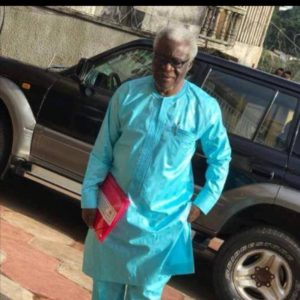 A national workshop to raise awareness on nuclear safety for high level officers and decision makers in Sierra Leone was recently hosted in Freetown through the initiative of the Sierra Leone Ambassador to Germany, Dr. M’Baimba Lamin Baryoh and organised by the Nuclear Safety and Radiation Authority with support from the International Atomic Energy Agency (IAEA) in Vienna Austria. Ambassador Baryoh is the country’s Permanent Representative to the IAEA as ambassador also accredited to Austria.
A national workshop to raise awareness on nuclear safety for high level officers and decision makers in Sierra Leone was recently hosted in Freetown through the initiative of the Sierra Leone Ambassador to Germany, Dr. M’Baimba Lamin Baryoh and organised by the Nuclear Safety and Radiation Authority with support from the International Atomic Energy Agency (IAEA) in Vienna Austria. Ambassador Baryoh is the country’s Permanent Representative to the IAEA as ambassador also accredited to Austria.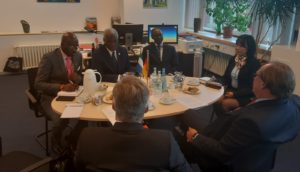 Sierra Leone is close to meeting the mandatory 15% budgetary allocation to its health sector in line with the Abuja Declaration, Health and Sanitation Minister Pro. Dr. Alpha Wurie told German government officials in a series of bilateral meetings, and in separate meeting with SIEMENS Healthliners during his recent invitation to Berlin to attend the World Health Forum and the 6th German-African Healthcare Forum respectively, the latter in which he participated in two panel discussions.
Sierra Leone is close to meeting the mandatory 15% budgetary allocation to its health sector in line with the Abuja Declaration, Health and Sanitation Minister Pro. Dr. Alpha Wurie told German government officials in a series of bilateral meetings, and in separate meeting with SIEMENS Healthliners during his recent invitation to Berlin to attend the World Health Forum and the 6th German-African Healthcare Forum respectively, the latter in which he participated in two panel discussions. Dr. Wurie also briefed him about the introduction of a nationwide ambulance service, procurement of an ambulance boat for Bonthe, the plans for the renting of holding houses for easy access to treatment facility and the expansion of the blood bank service etc.
Dr. Wurie also briefed him about the introduction of a nationwide ambulance service, procurement of an ambulance boat for Bonthe, the plans for the renting of holding houses for easy access to treatment facility and the expansion of the blood bank service etc.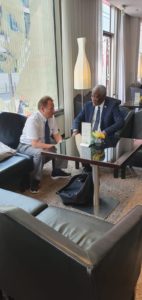 Relationship between the Government of Germany and Sierra Leone is being further strengthened by a meeting in Berlin of the German Ambassador to Sierra Leone, Horst Gruner and Ambassador of Sierra Leone to Germany, Dr. MBaimba Lamin Baryoh.
Relationship between the Government of Germany and Sierra Leone is being further strengthened by a meeting in Berlin of the German Ambassador to Sierra Leone, Horst Gruner and Ambassador of Sierra Leone to Germany, Dr. MBaimba Lamin Baryoh. Ambassador MBaimba Baryoh, on Tuesday August 20th paid a courtesy call to Mr. Christoph Kannengießer, Chief Executive Officer of the Africa Association of German Business (Africa Verein) and their discussion centred around an upcoming event later this year at which Sierra Leone will possibly occupy centre stage.
Ambassador MBaimba Baryoh, on Tuesday August 20th paid a courtesy call to Mr. Christoph Kannengießer, Chief Executive Officer of the Africa Association of German Business (Africa Verein) and their discussion centred around an upcoming event later this year at which Sierra Leone will possibly occupy centre stage. Accompanied by Deputy Ambassador Jonathan Leigh and Protocol Officer Beatrix Brewer, Ambassador Baryoh explained the present status of Sierra Leone’s intention to joining the group and how much efforts are being made. He was informed by Ambassador Dogler that an African country will have to volunteer itself for membership and approval giving at the margins of the World Bank and IMF meeting. But the offices of both financial institutions in the African country will have to do the recommendation. He then advised that Sierra Leone get in touch with both offices in Freetown.
Accompanied by Deputy Ambassador Jonathan Leigh and Protocol Officer Beatrix Brewer, Ambassador Baryoh explained the present status of Sierra Leone’s intention to joining the group and how much efforts are being made. He was informed by Ambassador Dogler that an African country will have to volunteer itself for membership and approval giving at the margins of the World Bank and IMF meeting. But the offices of both financial institutions in the African country will have to do the recommendation. He then advised that Sierra Leone get in touch with both offices in Freetown.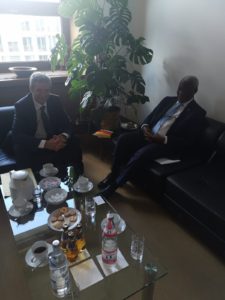 training and thus seeking German support. Mr Dogler highlighted the bilateral cooperation between Germany and Sierra Leone and explained that there is an envelope of money used for feasibility study into certain sectors away from the traditional support to private sector development like energy, education and finance and referred Ambassador Baryoh to get in touch with a Mr. Rauh who is his counterpart for West Africa.
training and thus seeking German support. Mr Dogler highlighted the bilateral cooperation between Germany and Sierra Leone and explained that there is an envelope of money used for feasibility study into certain sectors away from the traditional support to private sector development like energy, education and finance and referred Ambassador Baryoh to get in touch with a Mr. Rauh who is his counterpart for West Africa.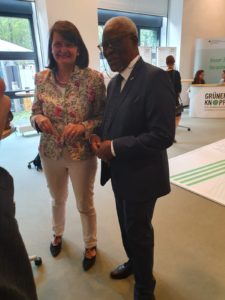 Meanwhile in a related development, Ambassador Baryoh also met with the Parliamentary State Secretary to the Federal Minister for Economic Cooperation and Development Dr. Maria Flachsbarth at a diplomatic reception wherein they briefly discussed the Compact with Africa in the area of reform partnership. They are to meet on a later date to expand on the discussion.
Meanwhile in a related development, Ambassador Baryoh also met with the Parliamentary State Secretary to the Federal Minister for Economic Cooperation and Development Dr. Maria Flachsbarth at a diplomatic reception wherein they briefly discussed the Compact with Africa in the area of reform partnership. They are to meet on a later date to expand on the discussion.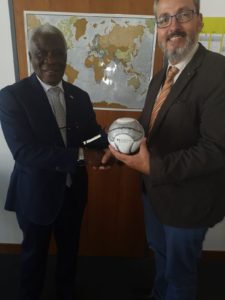 German Federal Interior Ministry have briefed Ambassador MBaimba Baryoh on the status of Sierra Leoneans legally residing in their country and those applying for asylum. The latter for whom the Ambassador asked to be provided with skill training, if possible after the verification and identification process would have been completed.
German Federal Interior Ministry have briefed Ambassador MBaimba Baryoh on the status of Sierra Leoneans legally residing in their country and those applying for asylum. The latter for whom the Ambassador asked to be provided with skill training, if possible after the verification and identification process would have been completed. 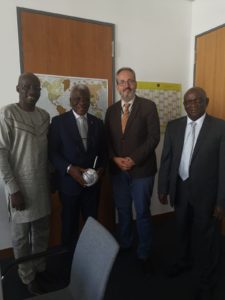
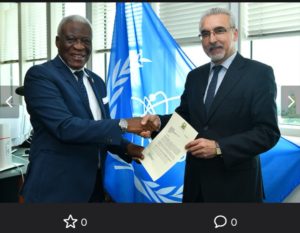 Ambassador to Germany, Dr. MBaimba Lamin Baryoh has presented his letters of Credence to the Presidents of Italy and Austria respectively, & to several multilateral organisations in both countries to which he is also accredited, and attended the 41 st conference of the Food and Agricultural Organisation (FAO) in Italy.
Ambassador to Germany, Dr. MBaimba Lamin Baryoh has presented his letters of Credence to the Presidents of Italy and Austria respectively, & to several multilateral organisations in both countries to which he is also accredited, and attended the 41 st conference of the Food and Agricultural Organisation (FAO) in Italy.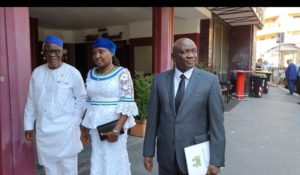
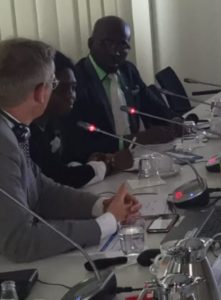 Sierra Leone’s membership in the West African Science Service Centre on Climate Change (WASCAL) is being negotiated, the country’s Deputy Ambassador in Germany Jonathan Leigh was told on Wednesday 12th July 2019 at a preparatory meeting with African WASCAL Ambassadors in Berlin at the invitation of the German Federal Ministry of Education and Research.
Sierra Leone’s membership in the West African Science Service Centre on Climate Change (WASCAL) is being negotiated, the country’s Deputy Ambassador in Germany Jonathan Leigh was told on Wednesday 12th July 2019 at a preparatory meeting with African WASCAL Ambassadors in Berlin at the invitation of the German Federal Ministry of Education and Research. asked why is it that not all the West African countries are members of WASCAL. On relationship or collaboration with the UN Inter-Governmental Panel on Climate Change (IPCC), he was told that the latter educate researchers in negotiation and can provide expertise.
asked why is it that not all the West African countries are members of WASCAL. On relationship or collaboration with the UN Inter-Governmental Panel on Climate Change (IPCC), he was told that the latter educate researchers in negotiation and can provide expertise.